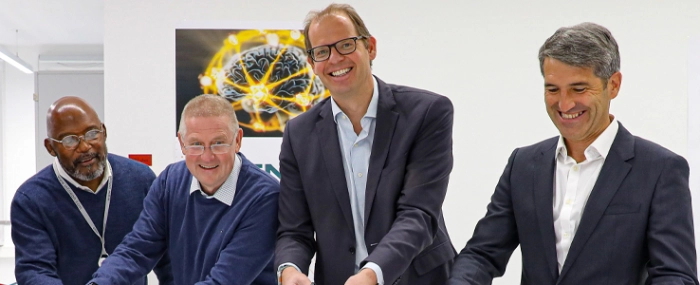
Infineon opens quantum electronics and Power AI lab
Infineon has opened a new laboratory for the development of quantum electronics in Oberhaching near Munich.
The goal is to develop and test microelectronic circuits for quantum computers which will be stable and small, will operate reliably and can be produced on an industrial scale.
Approximately 20 researchers will work at the lab. In addition to quantum computing, Infineon says that activities will also focus on the development of AI algorithms for the early detection of variances in power systems.
"Infineon plans to reinvent the core element of the quantum computer. One of the central tasks of the new quantum laboratory will be to develop and test electronic systems for ion trap quantum computing with the objective of integrating these systems in the Quantum Processing Unit. This is a prerequisite for making quantum computing scalable and useable," says Richard Kuncic, Senior Vice President and General Manager Power Systems at Infineon Technologies, in a press release.
The company has installed an innovative cryostat, a kind of super-refrigerator which can cool down to temperatures as low as 4 degrees Kelvin (-269 degrees Celsius). Qubits, the smallest units for calculations with quantum computers, are extremely sensitive and only adequately stable under extreme conditions, typically temperatures below -250 degrees Celsius and at the lowest possible pressures. And the electronic systems have to keep working perfectly in spite of these extreme conditions. In environments this cold, many materials change their properties, including their electric behaviour.
Although there are already a substantial number of quantum computers, these are installations made by and for research facilities. Several development steps will have to be mastered before scaling to powerful quantum computers and industrialisation of the technology. This includes the precise electronic manipulation of hundreds and thousands of qubits.
Among other things, the team in Oberhaching is developing optical detectors for reading out the quantum states of the ions. Here the colleagues work together closely with the Infineon quantum laboratory in Villach, which itself specialises in ion traps. The new lab will also pursue synergies with the colleagues in Dresden and Regensburg who conduct research on silicon and superconductor qubits.
In the area of power semiconductors, the laboratory will use AI to simulate and better predict the ageing and failure characteristics of microelectronics in the Power sector. This calls not only for the development of the necessary algorithms; but much more, practical measurements will have to establish the data basis for training neural networks and verifying their behaviour.

